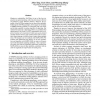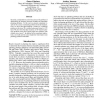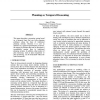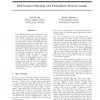125
click to vote
AIPS
2006
15 years 3 months ago
2006
Planning as satisfiability (SAT-Plan) is one of the best approaches to optimal planning, which has been shown effective on problems in many different domains. However, the potenti...
122
click to vote
FLAIRS
2008
15 years 4 months ago
2008
There are a lot of approaches for solving planning problems. Many of these approaches are based on `brute force` search methods and do not care about structures of plans previousl...
113
click to vote
AIPS
2008
15 years 4 months ago
2008
Recently, considerable focus has been given to the problem of determining the boundary between tractable and intractable planning problems. To this end, we present complexity resu...
AIPS
2008
15 years 4 months ago
2008
Researchers have developed a huge number of algorithms to solve classical planning problems. We provide a way to use these algorithms, unmodified, to generate strong-cyclic soluti...
115
Voted
AIPS
2007
15 years 4 months ago
2007
Decomposition has proved an effective strategy in planning, with one decomposition-based planner, SGPLAN, exhibiting strong performance in the last two IPCs. By decomposing planni...
124
Voted
AIPS
2007
15 years 4 months ago
2007
We present three new complexity results for classes of planning problems with simple causal graphs. First, we describe a polynomial time algorithm that uses macros to generate pla...
118
Voted
KR
1991
Springer
15 years 5 months ago
1991
Springer
This paper describes a reasoning system based on a temporal logic that can solve planning problems along the lines of traditional planning systems. Because it is cast as inference...
117
click to vote
ECAI
2006
Springer
15 years 6 months ago
2006
Springer
Abstract. We address the problem of representing big sets of binary constraints compactly. Binary constraints in the form of 2literal clauses are ubiquitous in propositional formul...
117
click to vote
KR
1994
Springer
15 years 6 months ago
1994
Springer
Probabilistic AI planning methods that minimize expected execution cost have a neutral attitude towards risk. We demonstrate how one can transform planning problems for risk-sensi...
135
click to vote
ECP
1997
Springer
15 years 6 months ago
1997
Springer
We present a framework for encoding planning problems in logic programs with negation as failure, having computational e ciency as our major consideration. In order to accomplish o...




